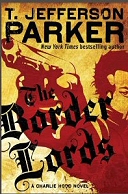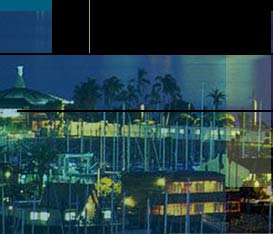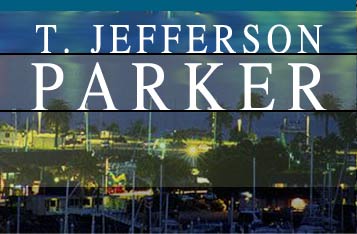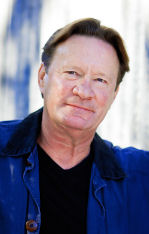


When it comes to the crime-based fiction that long has played such an important
role in the literary life of Los Angeles, we're living through what amounts to a
golden age.
 The dark ecstasies of James Ellroy, Michael Connelly's artful probing of the
inner monologue, Joe Wambaugh's explorations of black comedy as morality play,
Walter Mosley's blend of empathy and formal ambition and T. Jefferson Parker's
propulsive but pitch-perfect works of social realism continue to chip away at
the traditional boundaries between their genre and literary fiction.
The dark ecstasies of James Ellroy, Michael Connelly's artful probing of the
inner monologue, Joe Wambaugh's explorations of black comedy as morality play,
Walter Mosley's blend of empathy and formal ambition and T. Jefferson Parker's
propulsive but pitch-perfect works of social realism continue to chip away at
the traditional boundaries between their genre and literary fiction.
That's become particularly true in Parker's case, and with his fourth Charlie
Hood novel, "The Border Lords," his work takes a decisive turn into new levels
of moral and fictional complexity. This volume is the latest in what the author
intends to be a six-book series played out against the flow of drugs up from
Mexico and arms south from the United States in a deadly symbiosis that
currently is racking Mexico's civil society and reshaping swaths of America's
border states. With each novel in the series — "L.A. Outlaws," "The Renegades"
and "Iron River" — Parker has pushed more deeply into a situation saturated with
blood and tragedy and which both Mexico City and Washington seem to lack the
will to confront.
Save on daily L.A. Times deals powered by Groupon.
There's been a great deal of first-rate journalism on this corrosive crisis —
some substantial part of it in this newspaper — but no novelist or short story
writer in either English or Spanish has come close to portraying its depths and
their implications as well, or as artfully, as Parker.
The border, for both peoples, always has been a moral frontier and a boundary of
the imagination as much as a political one, and in this latest novel Parker
takes full advantage of the physical and mental landscape's ambiguities. Almost
nothing or no one in this gripping narrative is exactly who or what they seem to
be. The author, moreover, has a knowing hand and pushes — in a sophisticated but
never merely ironic way — against familiar literary memories as varied as Cormac
McCarthy's border-hopping cowboys, Carlos Castaneda's Native American shaman and
Graham Greene's whiskey priest. In fact, the book's most chilling character —
and it's a tight competition — is a twisted pirouette off Greene's memorable
character and one of the most appalling clerics in contemporary literature, if
he really is what he appears to be.
Like the three previous novels in what Parker now conceives as his "Border"
series, this one centers on the redoubtable Charlie Hood, a Los Angeles County
Sheriff's deputy on loan to the ATF to help suppress the gun trade along the
border. Parker introduces a new character here, Hood's friend, Sean Ozburn, an
ATF agent married to a beautiful Laguna Beach lifeguard and operating under the
deepest cover within one of the most murderous Mexican drug cartels.
Mysteriously and alarmingly, Ozburn, who is supposed to file regular e-mail
reports, has slipped out of touch. The real action begins when Hood and his
colleagues suddenly lose the audio and video connections they've been using to
monitor a house on the American side that cartel hit men are using as a staging
point for assassinations. When they arrive and find the gunmen all dead, they
also recover a video image of Ozburn severing their link.
Hood's pursuit of his friend, who has fallen under the strange, possibly
malevolent influence of an Irish priest who seeks a more direct defeat of evil
than a pulpit provides, forms the spine of a narrative unfolding from Costa Rica
to Lancaster. As with all Parker novels, the Southern California landscape,
including West Hollywood and downtown's contemporary bar scene, is rendered with
a fine, accurate eye. The author peoples them with an array of beautifully drawn
secondary characters, and readers of the earlier books in this series will
recognize the brilliant but corrupt cop, Bradley Jones, and the devious Mike
Finnegan, both seeming destined for major roles in the coming novels.
"The Border Lords" represents a breakthrough for a novelist whose
accomplishments already are many and notable. There's moral intelligence at work
here but never a sentence that moralizes, nor concessions to generic conventions
for cheap effect. It's a book that stands firmly in the entertaining,
hard-boiled tradition and yet artfully demands serious consideration purely as a
superior work of fiction.
One is reminded of an earlier era in which that seemed somehow impossible. In
1939, for example, the great Raymond Chandler, distraught over the lack of
critical notice for "The Big Sleep" despite its literary publisher, Knopf, wrote
to his friend Erle Stanley Gardner in near despair. His masterful novel had
earned Chandler just a few hundred dollars and what made for a great book built
around crime was much on his mind. Great literature, he wrote to Gardner, "is
the perfection of control over the movement of a story similar to the control of
a great pitcher. That to me is what you have and more than anyone else. Dumas
had it, Dickens, allowing for his Victorian muddle, had it.... Every page [of
Gardner's stories] holds the hook for the next. I call that a kind of genius."
So does this reader, which makes "The Border Lords" an exceptional pleasure.
timothy.rutten@latimes.com
Copyright © 2011, Los
Angeles Times








